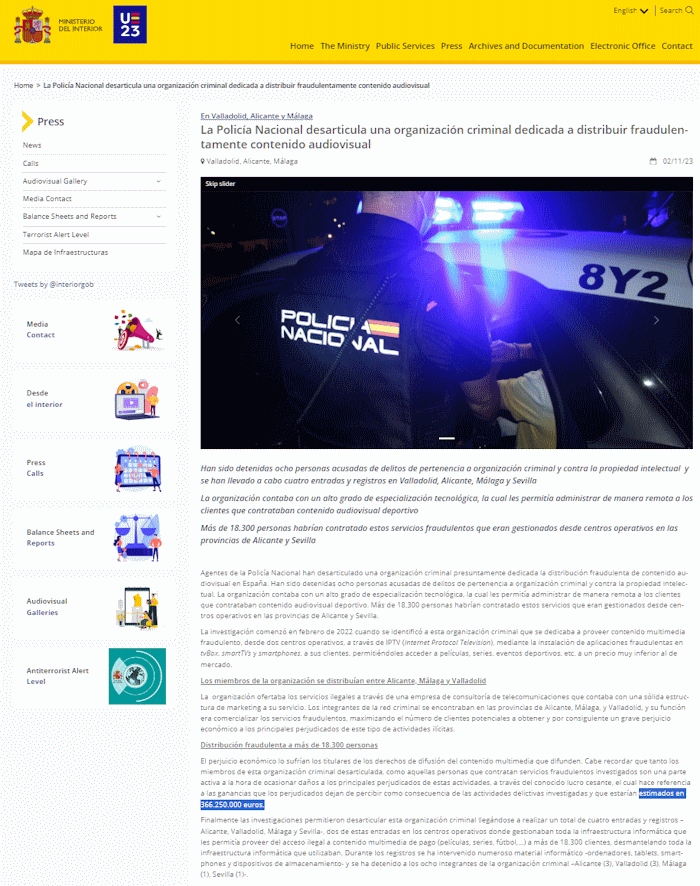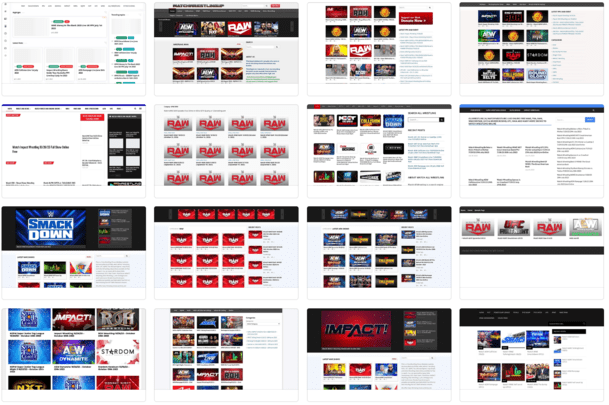-
chevron_right
Police Dismantle Pirate IPTV Operation, Bogus “€366m Losses” Claim Goes Viral
news.movim.eu / TorrentFreak · Thursday, 2 November, 2023 - 20:41 · 3 minutes
 An announcement by Spain’s National Police (Policía Nacional) this morning was in many respects nothing out of the ordinary.
An announcement by Spain’s National Police (Policía Nacional) this morning was in many respects nothing out of the ordinary.
In common with almost every country with a movie and TV show market to protect, Spain regularly conducts operations to shut down or disrupt local pirate IPTV services. The operation detailed in a press release this morning, distributed via official police website Policia.es and the Ministry of the Interior’s website at Interior.gob.es, seems significant.
Investigation Began Last Year
The authorities say they began investigating the “criminal organization” in February 2022. From operations centers in Alicante and Seville, the suspects allegedly provided “fraudulent multimedia content” via IPTV by installing “fraudulent applications” on customers’ devices, including set-top boxes, smart TVs, and mobile phones. As a result, movies, TV shows, and live sporting events, were available at a rate much lower than the legitimate market price.
 “The organization offered illegal services through a telecommunications consulting company that had a solid marketing structure at its service,” police explained.
“The organization offered illegal services through a telecommunications consulting company that had a solid marketing structure at its service,” police explained.
“The members of the criminal network were in the provinces of Alicante, Malaga, and Valladolid, and their function was to market fraudulent services, maximizing the number of potential clients to be obtained while causing serious economic damage to the main victims of this type of illegal activity.”
Police carried out raids on four locations in Spain and a total of eight people were arrested; Valladolid (3), Alicante (3), Málaga (1) and Seville (1). All stand accused of serious crimes including membership of a criminal organization and intellectual property offenses.
Police say the suspects had a “high degree of technological specialization” which allowed them to remotely manage clients who subscribed to sports audiovisual content. The suspects’ “entire IT infrastructure” was dismantled, police report.
Massive Damage to Rightsholders
Before revealing the financial losses suffered by legitimate rightsholders, the police statement notes that while the criminal organization has been dismantled, those who subscribe to pirate services “are an active party in causing damage to the main victims of these activities through well-known loss of profits.”
In other words, members of the public who subscribed are partly responsible for the losses incurred by rightsholders. By any standard, the scale of the losses reported by police this morning are considerable.
“[W]ell-known loss of profits…refers to the profits that the injured parties no longer receive as a consequence of the criminal activities investigated, which can be estimated at 366,250,000 euros.”
Anyone familiar with copyright-related losses will be aware that major rightsholders always go big on potential losses. They certainly look good in headlines like this one.
Any figure can be justified with the right approach and since the numbers are hypothetical, the best a sensible argument to the contrary will ever achieve is the production of a smaller, more boring number.
Calming Calculations
Whether €366m in losses sounded reasonable or simply got everyone very, very excited this morning is unclear. According to dozens of local media outlets and increasingly those further afield, that number was reported by police and the government so needs no further scrutiny.
According to police the-now dismantled service had 18,300 subscribers. So, if the total losses are €366 million, each individual subscriber to the service caused losses to rightsholders of €20,000. Inflation strikes again?
On Second Thoughts….
Visitors to the press release made available on Policia.es this morning saw the text as it appears in the image below. Those who visit the site right now will notice that small but pretty important edits have taken place, as confirmed by the current text at this URL vs the copy from this morning as it appears in Google’s cache .
If this was a sudden recalculation at the last minute, that raises the question of why the new figure is actually unreasonably low . If it was a plain error, that’s a human trait that none of us can avoid; what we can do is take it on the chin and publish a transparent correction.
That doesn’t appear to have happened here and that is already causing significant problems. As things standard, the truth can only be found buried away in an invisible edit. The media, on the other hand, simply printed what they were given, presumably based at least partly on trust ( 1 , 2 ,3)
If the big loss claim isn’t a fact on Wikipedia already, it will be soon. From there, anything can happen, and probably will. The Ministry of the Interior, meanwhile, is yet to change its mind .
From: TF , for the latest news on copyright battles, piracy and more.





 Two years ago, several movie production companies, including the makers of Hellboy, Rambo V, The Hitman’s Bodyguard, and Dallas Buyer’s Club,
Two years ago, several movie production companies, including the makers of Hellboy, Rambo V, The Hitman’s Bodyguard, and Dallas Buyer’s Club,

 Over the years we have seen dozens of anti-piracy campaigns. Initially, many of these tried to appeal to people’s morals.
Over the years we have seen dozens of anti-piracy campaigns. Initially, many of these tried to appeal to people’s morals.
 Across the globe, law enforcement and copyright holder groups are teaming up to tackle online piracy of all shapes and sizes.
Across the globe, law enforcement and copyright holder groups are teaming up to tackle online piracy of all shapes and sizes.





 This summer, Lithuania
This summer, Lithuania





 Similar to any other online platforms that deal with user-generated content, Instagram and Facebook process thousands of copyright complaints daily.
Similar to any other online platforms that deal with user-generated content, Instagram and Facebook process thousands of copyright complaints daily.


 The Entertainment Software Association (
The Entertainment Software Association (

